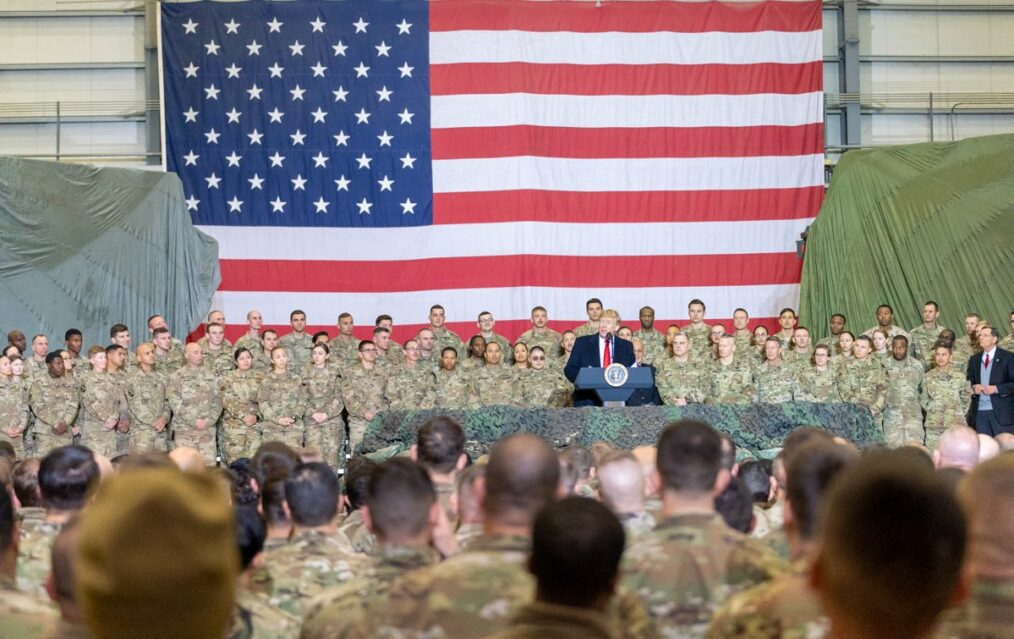
President Trump resumed peace talks with the Taliban on his first trip to Afghanistan
President Trump recently travelled to Afghanistan for the first time and announced the resumption of peace talks with the Taliban just three months after he called them off. At Bagram Air Base, Trump told US troops that the Taliban “wants to make a deal very badly.”
“We’re going to stay until such time as we have a deal, or we have a victory, and they want to make a deal very badly,” Trump said, “The Taliban wants to make a deal — we’ll see if they make a deal. If they do, they do, and if they don’t they don’t. That’s fine.
However, analysts are led to one key question: Is that what they really want?
In short, the Taliban do not want peace and their sole objective is an Islamic Emirate — a government-controlled by them and sponsored by radical actors with anti-liberal democratic philosophies. Women would not be permitted to study, work in the government nor engage in other social activities like journalism or singing under such a regime.
Simply put, the Taliban wants to instill a system of coercion and devoid of any development of Afghan society. They are capable of such an achievement as long as they have strong financial backing and hideouts to retreat to during the wider resistance to US and Afghan forces.
President Ashraf Ghani joined Trump in Bagram and emphasized: “if the Taliban are sincere in their commitment to reaching a peace deal, they must accept a ceasefire.” Further, the Afghan president said, “We also emphasized that for any peace to last, terrorist safe havens outside Afghanistan must be dismantled.”
Trump must stop legitimizing the Taliban if he has any hopes to end the United States’ longest war in Afghanistan. It is impractical to devote attention to the Taliban as they continue to engage in terrorism — which consequently augments their reputation — amidst the scenario where the Afghan government remains engaged in combatting them. As a result of this, the Taliban emerged as the key victor after nearly two years of peace talks and an unprecedented ceasefire in June 2018. The ceasefire meant little as the Taliban continued to target civilians and casualties tripled.
The Taliban continue to heighten their demands anytime the subject of peace talks is broached by U.S. officials. An increase in demands highlights the fact that the Taliban feel emboldened due to the attention focused on them. It is a similar case experienced by the Afghan government between the 1980s to the early ‘90s.
In the 1980s, Afghan mujahidin (fighters backed by the US to counter the Soviets) reportedly refused to speak with the communist Afghan government in favor of the Kremlin — the actor they considered to be key powerbroker. The mujahidin demanded that the Soviet Union withdraw and only at that point would they make peace with officials in Kabul. This was not the case and Afghan soon fell into civil war in 1992. The Taliban emerged in 1996 and continues to engage in this intra-Afghan conflict that escapes resolution. It is apparent that this scenario is essentially familiar, however now, the Taliban wants US troops to leave so that they can dismantle the Afghan government.
Therefore, the US must be hesitant in placing trust in the Taliban as history demonstrates ulterior motives are often at the core of such decisions. Going forward, the US should continue to apply pressure on the state-sponsors of terrorism outside Afghanistan by implementing the 2018 South-East Strategy while aiding the Afghan government.
Uncertainty is the best word to describe the current situation in Afghanistan. Any public perception of peace has been quashed by the Taliban’s terrorist attacks and ongoing peace talks. The US must choose its positions and policies carefully in regard to Afghanistan as it would be detrimental for Washington to be manipulated by the Taliban.

